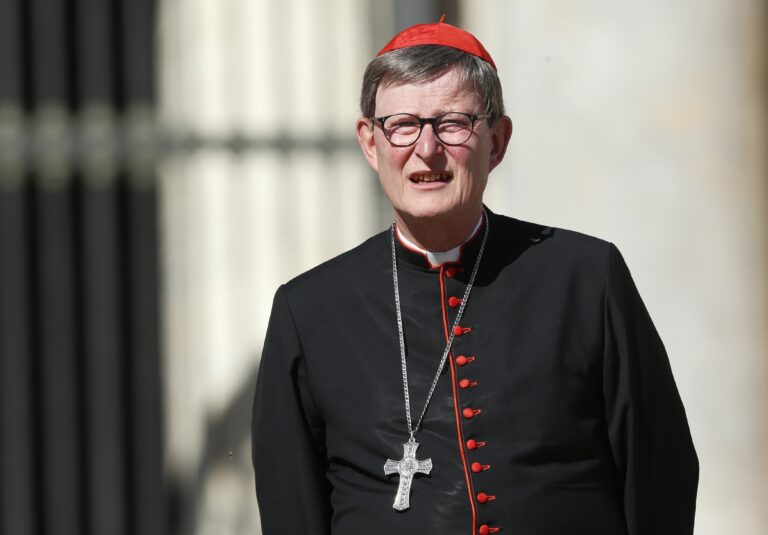Cardinal Rainer Maria Woelki of Cologne has expressed strong concern about the state of the Catholic Church in Germany.
“I have the impression that our Church in Germany is more polarised than ever,” the archbishop said in a lecture on the Synodal Path reform dialogue published on the Archdiocese of Cologne’s website.
“There were already tensions before, we all know that. But now they are so strong that I am increasingly worried.”
Nevertheless, some of the resolutions of the Synodal Path could be implemented, Woelki said in a speech to the laypeople’s association of the archdiocese, the Diocesan Council, in mid-November.
The bishops and the Central Committee of German Catholics (ZdK) launched the Synodal Path reform dialogue in 2019 in response to the abuse scandal. The consultations of the Synodal Assembly, which ended in spring 2023, focused on sexual morality, the priestly way of life, power and the separation of powers as well as the role of women in the church.
Woelki said the Synodal Path posed a threat to the unity of the Universal Church and that he had therefore voted against resolutions that he believed would jeopardise unity. “But I didn’t want to be a pure naysayer either – even if I did vote no on some issues.”
He said it was up to the pope to decide on the most controversial issues including the abolition of celibacy for priests, the ordination of women to the priesthood and the re-evaluation of homosexuality. He was therefore grateful that German bishops had raised these problems and questions during the Synod on Synodality in Rome in October.
“If in these questions the papal magisterium – contrary to my theological assessment – comes to a different assessment of what the revelation of God, which wants to lead us to communion with God and to complete joy, and church tradition tell us, I will willingly follow it,” said Woelki.
The cardinal said the consultations of the Synodal Path were “unfortunately not always very synodal”. There had not been enough time to really understand, listen to and analyse the arguments.
Woelki also reiterated his rejection of the Synodal Committee which is made up of laypeople and bishops. Its aim is to create a permanent structure for the reform debate and prepare the establishment of a Synodal Council which in turn has been prohibited by Pope Francis.
“I cannot go against the pope’s instructions or those of his closest counsellors,” said Woelki. “For me, such a path leads to a dead end.”
He added, however, that some reforms discussed in the Synodal Path which could be implemented very well for the archdiocese of Cologne – for example regarding measures against sexualised violence and reforms of priest training. Cologne, he said, had been the first diocese in Germany to introduce a psychological potential analysis of every candidate across the board.
Woelki’s comments come a week after the president of the German Bishops’ Conference, Bishop Georg Baetzing, and his Polish counterpart, Archbishop Stanislaw Gadecki, spoke about their irritations after the letter by Gadecki to Pope Francis with concerns regarding reforms underway in the Catholic Church in Germany.
Baetzing told Germany’s Catholic News Agency (KNA) that the two churchmen had “spoken honestly about the irritations that have arisen”.
He added: “We agreed that these are not easy times for the church in both countries – and that we want to stand together as neighbours, especially in these times, even if we perceive cultural differences in the legitimate diversity of Catholicism and seek our way into a good future in which we want to spread the gospel to people as we have always done”, said Baetzing.
He said he had spoken with Gadecki on Monday evening at the start of the plenary assembly of the Council of Bishops’ Conferences of Europe (CCEE).
The Warsaw daily newspaper Rzeczpospolita had published a letter from Baetzing to Gadecki on Monday in which the German bishop complained in unusually vehement terms about Gadecki’s letter of protest to Pope Francis against central reform ideas of the Synodal Path reform project in Germany.
Baetzing accused Gadecki of “unbrotherly behaviour” and of an “enormous overstepping of his authority”. The Warsaw daily newspaper Rzeczpospolita published Baetzing’s letter, dated November 21, on Monday.
In it, Baetzing had said that in the talks during the Synod on Synodality in the Vatican in October, Gadecki had not uttered a word about having written a letter to Francis at the beginning of October criticising the German Synodal Path.
Instead of engaging in dialogue, Gadecki had decided to make false claims about the German reform process to the pope, said Baetzing.
Gadecki’s letter only became public in mid-November when Poland’s Catholic News Agency KAI published it. In it, Gadecki criticised several resolutions of the Synodal Path, such as blessings for same-sex couples, as “extremely unacceptable and un-Catholic”.
The German church reformers evidently wanted to bring about a revolution that was “inspired by left-liberal ideologies” rather than by the gospel, Gadecki had written to Francis.
Originally published by KNA Germany.



